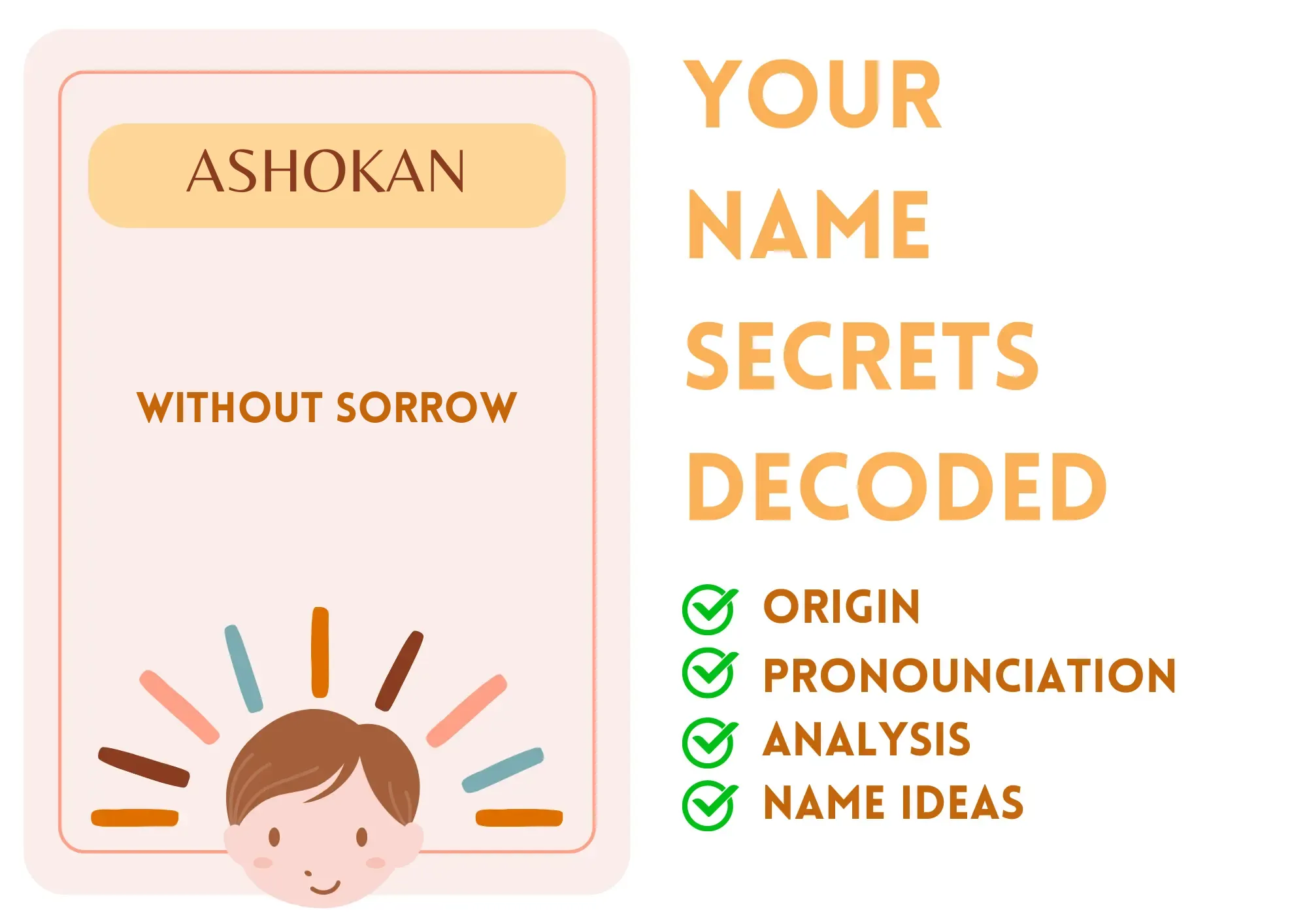
Ashokan
Ashokan is a name of significant cultural and historical depth, originating from the Sanskrit language. It derives from the ancient Indian word 'Ashoka', meaning 'without sorrow'. The name is often associated with Emperor Ashoka, one of India's greatest historical figures. Primarily a masculine name, Ashokan embodies attributes of strength, compassion, and enlightenment, resonating well in both Hindu and Buddhist cultures. People are drawn to this name for its unique sound and storied background, making it a cherished choice among parents.
Ashokan feels timeless and culturally resonant, evoking a sense of grandeur and historical intrigue. It remains easy to pronounce and write, although the unique combination may lead to slight variations in spelling.
Basic Information
Gender: Boy
Sounds Like: uh-SHOH-kan
Pronunciation Explanation: The emphasis is on the second syllable, 'SHOH', with a soft 'kan' following. The 'A' sound is pronounced as 'uh'.
Summary and Meaning
Meaning: without sorrow
Origin: The name Ashokan originates from the Sanskrit language and is deeply entrenched in Indian culture and history.
Usage: Ashokan is traditionally a masculine name, widely used for boys owing to its historical and cultural significance.
Name Number (Chaldean)
Name Number (Pythagorean)
Name Constellation (Nakshatra)
Name Zodiac Sign (Rashi)
Popularity (Global Rank)
Overall: 34414
Boys: 30731
Most Popular in
Religious and Cultural Significance
Religion: Hindu and Buddhist
Background: Ashokan holds significance in both Hinduism and Buddhism. It is inspired by Emperor Ashoka, who converted to Buddhism and championed its spread across Asia.
Cultural Significance: The name carries cultural weight as it recalls the era of one of the most respected rulers in Indian history, Emperor Ashoka, known for his pivot from warfare to peaceful rule and promotion of Buddhism.
Historical Significance: Ashokan is closely linked to the historical figure of Emperor Ashoka the Great, who ruled the Indian subcontinent in the 3rd century BCE. His legacy includes the widespread dissemination of Buddhist beliefs and the establishment of a large, centralized empire marked by significant accomplishments in governance and culture.
Popular Culture
Literature and Mythology: Ashokan is frequently mentioned in historical narratives, literature focused on Indian history, and discussions of Buddhist conversions.
Movies and Television: Documentaries and period dramatizations of Emperor Ashoka's life often feature characters with the name or depiction of Ashokan imagery.
Feelings and Perceptions
Perception: Ashokan is perceived as a dignified and culturally rich name, imbued with historical grandeur and a sense of compassion due to its ties with Emperor Ashoka.
Positive Feelings: Historical, strong, compassionate, cultured, enlightened.
Negative Feelings: Might face challenges in pronunciation outside of Indian communities; can seem ornate or formal.
Practical Considerations
Ease of Writing and Calling: Ashokan is relatively easy to write but may require guidance on pronunciation for those unfamiliar with the name. It is smooth and rhythmic, making it pleasant to call out.
Common Typos and Misspellings: Ashoken,Asokan,Ashokann
Common Nicknames: Ash,Shoki,Kani
Ashokan Popularity
Ashokan Usage and Popularity By Country
| Country | Rank (Overall) |
|---|---|
| Bahrain | 1717 |
| Oman | 2818 |
| Brunei | 4178 |
| United Arab Emirates | 4344 |
| Qatar | 4662 |
| Libya | 4987 |
| Saudi Arabia | 7527 |
| India | 8405 |
| Sri Lanka | 10816 |
| Singapore | 11883 |
Ashokan Usage and Popularity By City
| City | Rank (Overall) |
|---|---|
| Chennai | 3051 |
| Bengaluru | 7057 |
| Bombay | 8509 |
| Thrissur | 1047 |
| Coimbatore | 2762 |
| Kannur | 635 |
| Palakkad | 697 |
| Kanchipuram | 2127 |
| Tiruvallur | 1428 |
| Selam | 1477 |
Compatibility Analysis
Famous Persons Named Ashokan
Related Names
Similar Sounding Names:
Ashok,Ashvin,Ashish,Akash